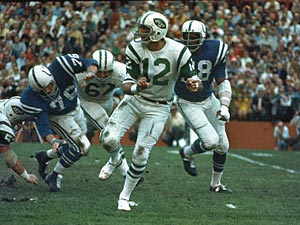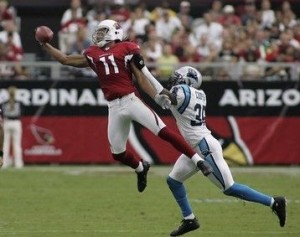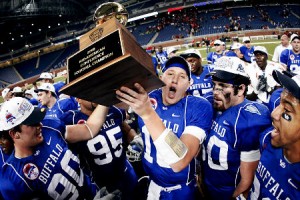Sports, Spirituality, and the Role of the Underdog

There will always be a place for underdogs, like the New York Jets in Super Bowl III, in sports.
There’s more to life than sports, for sure, but there’s more to sports than sports…
There’s a lot of life in sports. As a theologian, psychologist, author and more recently also a financial strategist, I have identified the psycho-spiritual-political dimensions of rooting for the underdog, being the underdog, and the ways in which spirituality, psychology, and even irrational belief can trump size, talent, and win/loss records, and how these dynamics and principles can be useful in the quest for success and victory at various levels and in various arenas, not the least of which, economic.
Any sports fan knows there’s a reason the “worst” team vs. the “best” team still have to play the game. There is a reason why upsets occur, more often than we might think, and why sports pundits and odds makers who ignore the intangible factors in a match-up, do so at their peril.
To illustrate the point, let’s revisit the 2008 NFL playoffs. Something Funny Happened on the Way to the Superbowl!
Enter the Baltimore Ravens. They barely qualified for the playoffs. Their first round opponents, The Tennessee Titans (or Flaming T’s as my eleven year old daughter insists on calling them) had been undefeated just a few games before, but on this particular day they were fumbling, being intercepted, coughing up the ball every way possible in a way that was more than just bad luck or sloppy play.

Larry Fitzgerald and the Arizona Cardinals were the surprise team of the 2008 playoffs and very nearly won the Super Bowl.
Next come the Cardinals. Same thing. The heavily favored Carolina Panthers couldn’t hold onto the ball to save their lives. Fumbles. Interceptions. Huge differentials in takeaways, and again, the underdogs prevailed.
And again, the Eagles over the reigning World Champion Giants. Same song, third verse!
And the Cardinals, again, over the Eagles.
Now switch to the International Bowl, Toronto, Ontario, where the University at Buffalo Bulls (UB) nearly defeated the UConn Huskies.
UB was making their first Bowl appearance in history as the unlikely MAC Champs.
Despite gaining only 75 total yards and failing to complete a single third down conversion, the Bulls were leading 20-10 at halftime, almost exclusively on the strength of their ability to capitalize on UConn fumbles.
There were five fumbles all together, in the first half alone. Fumbles near the Bulls goal line. Fumbles during punt and kickoff returns. After the second fumble it became the theatre of the absurd. Except it wasn’t!

Few expected the University of Buffalo to defeat Ball State and win the MAC Championship.
We attribute UB’s their record-breaking multiple upset season to their miracle coach Turner Gill, who, on his first day on the job, implored his players to “believe in things not yet seen.” When Gill came on the scene with his talk about belief, the team had only won ten games in seven years. Just three years later, they were playing in a Bowl game.
All of this is way too much for any kind of luck or coincidence. It is the spiritual dimension of underdog-dom at work.
It is David v Goliath, Moses v the Red Sea, the Israelites v the Philistines… and perhaps the Yankees v the British Empire.
When underdogs believe in themselves to the point of delusional confidence, the spiritual forces in the world align with them. The greater the combination of the unlikelihood of victory and the unshakability of confidence in victory, the more dramatic and ostensibly absurd their victory (or near victory) becomes.
It could be called the “Law of Attraction.” It is envisioning your success. Believing it before it happens. Living and thinking it as if it has already happened. Acting as if it is inevitable. And doing your damnedest to make it inevitable.
Identifying underdog sports as a category and its fans as more than the fans of a particular team or town that happens to be identified at one time or another as underdog, is an attempt to create a community around the theme of beating the odds, overcoming adversity, and finding success by thinking outside the box.
Yes, it applies to sports as a starting point, but only a starting point. We achieve success, redemption, revenge, justification and vindication whenever our underdog sports surrogates beat the favorites, the point spread, and all rational expectations to achieve the unimaginable.
After vicarious success, comes real, personal and collective success.
And this is why it is so important to encourage children to participate in competitive sports, why sports are and should be emphasized for spectators as well as players in our schools.
The psychospirituality of sport as a means of upward mobility, of equal opportunity, and of resilience and perseverance is essential to inculcate each new generation with the expectation of success no matter who they are, no matter where they come from, no matter what obstacles they face.
John Howell is a regular contributor to Sports Then and Now.
Very nice information available here, I appreciate you sharing your thoughts and article with me. I am most certainly going to Digg this for all of my pals.